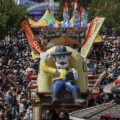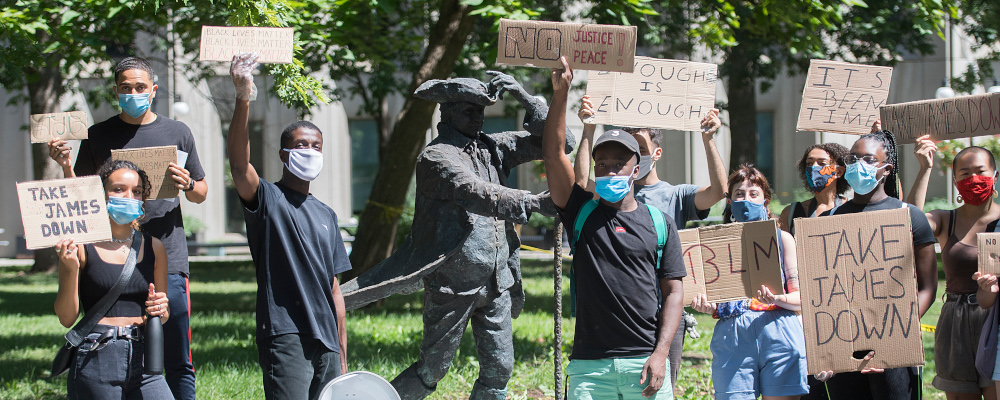I studied history at Lakehead University in Thunder Bay in the early 2000s. It was a small yet pretty impressive department that outperformed its size in research grants, publications, and instruction quality. Specialized scholars like Bruce Muirhead and Ron Harpelle were leaders in their fields. Old-school professors like Victor Smith and Peter Raffo were fountains of knowledge and compelling lecturers.
Perhaps due to its small size, geographical isolation, and the disparate and eclectic interests of the faculty, it wasn’t a polarized place. One would have found the usual Left-Right debates in seminars about Pierre Trudeau or Margaret Thatcher or whatever. But otherwise, the so-called “History Wars” of the 1990s never quite reached Thunder Bay.
I had barely heard of them when I arrived at Carleton University in fall 2005 to start my master’s degree. It soon became clear, however, that its history department was on the front lines of an unfolding intellectual battle. The main source of the conflagration was Jack Granatstein’s book, Who Killed Canadian History?
Released roughly seven years earlier, the book had galvanized the history world for its sharp criticism of academic historians’ drift into what Granatstein termed the “new histories” of gender, labour, and “the lives of obscure social reformers.” It precipitated a major debate about the role and purpose of historical scholarship and the tensions between the old and new histories.
I knew his scholarship well because Muirhead (who had a huge intellectual influence on me) had completed his Ph.D. under Granatstein’s supervision and relied heavily on his articles and books for his own courses. I was vaguely familiar with Who Killed Canadian History? (I think I may have read a chapter or two as an undergraduate) but I had no idea of its controversy.
My naïve ignorance wasn’t shared by most of my classmates who were far more steeped in methods, theory, and the new histories than I was. They were also well familiar with Granatstein’s book and the reaction to it, including a sharp response from Carleton professor Brian McKillop in a 1999 issue of the Canadian Historical Review.
His essay, “Who Killed Canadian History? A View from the Trenches,” was probably the highest-profile and most sustained rebuttal to Granatstein’s arguments. It was assigned reading on many graduate course syllabuses during this period and made McKillop something of an elevated figure in Carleton’s history department.
I knew who he was and probably exchanged brief pleasantries with him on campus but never really interacted with him during my two years there. If Lakehead’s culture was relaxed, Carleton’s was marked by a subtle tension that took me a while to fully understand. It wasn’t quite a Left-Right divide—though it often manifested on that level too. It was more about how one conceptualized history and the proper focus and methods of historical scholarship. I remember self-consciously scrambling early in my first semester to figure out who this Foucault guy was and why everyone kept talking about him.
I predictably fell in with the “old historians.” Most of my classmates did not. The faculty itself tilted against Granatstein and was self-evidently moving further in that direction through retirements and new hires. Even if his book was a best-seller, it was clear by the time that I was a graduate student that his side was losing the war.
The process of departmental transformation through the admissions and hiring committees (“They took over the hiring processes in their departments, thus guaranteeing that they could replicate themselves at will, and they trained graduate students to do the kind of work they preached and practised”) was reshaping the entire academic field.
Looking back after 25 years, therefore, it’s not surprising that Granatstein’s critique faced an academic backlash or failed to arrest the negative developments that he foresaw. He was calling out intellectual trends that were inexorably on the march. Who Killed Canadian History? reads in hindsight like a losing combatant’s hopeless last stand.
What’s more surprising, however, is how moderate McKillop’s response is in the context of today’s intellectual climate. That’s not to say that his essay doesn’t reflect expressions of contemporary scholarship’s relativism or its overemphasis on identity. For McKillop, the principal problem was straightforward: Granatstein was an incurious reactionary whose conception of history is anachronistic and exclusionary—he even satirized it in religious terms as the “One True Faith.”
Yet he also acknowledged the decline of basic historical knowledge, the inherent benefits of cultivating a sense of national pride through historical education, and the (narrow) case for an affirmative national history about Canada’s contribution to the Battle of Vimy Ridge and other major collective accomplishments.
These concessions shouldn’t be perceived themselves as reactionary by any means—especially when balanced against McKillop’s full-throated critique of Granatstein and his book. But on today’s university campus where notions of anti-colonialism and cultural Marxism increasingly prevail, they’d be highly contested ideas. They might even be enough to cause McKillop himself to be thrown in with Granastein as two “angry old men.”
He recognizes for instance that “national history should be taught in the schools with an emphasis on national accomplishment” and “The cultivation of national pride in a citizenry through the intelligent study of its collective history is something only the most cynical among us would denigrate.” He even argues that “every Canadian student should know about the Canadian victory at Vimy Ridge in 1917”—a national accomplishment that historians are “uniformly proud of.”
There’s strong reason to doubt that one would find uniformity of support among today’s scholars for Canada’s past military contributions or McKillop’s defence of educational curriculum rooted in a history of national accomplishment. His intellectual heirs would presumably counter that as a settler society, Canada’s “national history” is colonialist, racist, and ultimately irredeemable. He doesn’t even refer to First Nations or Indigenous peoples in his essay.
In 2000, for instance, Tim Stanley, a University of Ottawa professor, published, “Why I Killed Canadian History: Towards an Anti-Racist History in Canada,” in a social history journal in which he criticized McKillop along these lines. In particular, he called him out for affirming Granatstein’s use of history “for nationalist purposes” and his own assumption that Canadians have “a shared past.”

The key point here is that if Granatstein’s ideas and arguments were already dead by the time that his book was released, the intellectual currents that he identified have moved so fast in the subsequent quarter century that even his biggest critic hasn’t been able to keep up. As early as 2000, McKillop’s perspective was insufficiently identitarian to satisfy the most radical voices among the rising ranks of new historians.
His personal experience is therefore as useful and damning a commentary on the state of historical scholarship as Granatstein’s book itself. The History Wars may have ended because McKillop’s side won, but what he and others didn’t realize was that after such a decisive victory, their revolutionary allies wouldn’t be satisfied with merely vanquishing unfashionable scholars like Granatstein. Soon they would set their sights on their own allies in an exercise of ideological conformity imposed by a combination of peer pressure, hiring preferences, and growing university bureaucracy.
As a young Ph.D. student observed in an earlier essay in this series, one can see in today’s job postings and research grant awards that not only have the Granatsteins been essentially purged from the field, but the McKillops increasingly have too. It demonstrates the inherent risks in today’s intellectual climate of aligning oneself with ideological radicals who deploy the language of inclusion but are ultimately only motivated by ideological conquest. The potential to go from ally to villain in such a context has proven swift and unadjudicated.
McKillop and others like him may have envisioned a world of adjustment and reform but ultimately one of peaceful co-existence with traditional historians like Granaststein. But twenty-five years later, it’s clear that this notion was as naïve as I was when I arrived at Carleton University. The goal of the radicals was always, as Granatstein predicted, to dispose of the old histories and their heretical practitioners altogether.
In the end, we certainly ended up with “One True Faith.” It just isn’t one that McKillop warned about or even one that has proven to ultimately have room for early apostles like him.
Recommended for You

Ben Woodfinden: Lament for an ‘elbows up’ nation

Falice Chin: The ‘wild and weird’ Calgary Stampede

‘A celebration of the spirit of Alberta’: Ryan Hastman on the political, economic, and cultural importance of the Calgary Stampede

Michael Geist: Children accessing porn is a problem, but government-approved age verification technologies are not the answer




